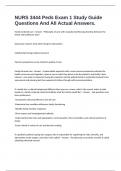NURS 3444 Peds Exam 1 Study Guide
Questions And All Actual Answers.
Family-centered care - Answer Philosophy of care with mutually beneficial partnership between the
family and healthcare team
Each party respects what other brings to interactions
Collaboration brings optimal outcome
Parents' perspective can be critical to quality of care
Family-focused care - Answer A paternalistic approach with a more narrow perspective wherein the
health-care team puts together a plan of care in what they deem to be the patient's and family's best
interest—care team is viewed as having the expertise and the patient/family is minimally involved in the
assessment and planning but then expected to follow through with recommendations
If a family has a cultural background different than yours as a nurse, what is the correct action to take
based on a family-centered model to facilitate what the family would like? - Answer -Ask questions and
learn preferences
-Incorporate cultural preferences into all care
-Determine how condition influences family functioning
-Identify family member responses
-Show respect and nonjudgmental attitude
-Understand family roles and organization, communication, time orientation, and cultural practices of
family
-Ensure family is center of care and decision making
If a pediatric patient is going into surgery, who is responsible for explaining the risks, benefits, and
alternatives to the surgery, and what is this called? - Answer The physician or provider, and this is called
obtaining informed consent
,Emancipated minor - Answer Economically self-supporting adolescents under age 18 who are not
subject to parental control and can legally give consent
-Married
-Pregnant
-Enlisted
-Incarcerated
Or minor parents of a child patient can legally give consent
Mature minors - Answer Adolescents between the ages of 14 and 18 able to understand treatment risks
may give independent consent to receive or refuse treatment for limited conditions by federal law, such
as testing and treating sexually transmitted infections, contraceptive services, substance abuse, and
mental health care
Do not have authority to consent for general medical treatment in most states
Assent - Answer Voluntary agreement to accept treatment or to participate in a research study
Child must have a basic understanding of what will be done and what is required for participation and
must know that they can dissent as well
In order to provide family-centered care, a nurse must: - Answer Always check in with the family about
decisions, their informed choices, and how this affects the child
Binuclear family - Answer A post divorce family in which the biologic children are members of two
nuclear households, with coparenting by the mother and the father. The children alternate between the
two homes, spending varying amounts of time with each parent in a situation called coparenting, usually
involving joint custody.
This type of family is a model for effective communication, in which both biological parents are involved
in the child's upbringing and provide additional support and role models in the form of extended family
members.
,Nuclear family - Answer Children live in a household with both biological parents and no other relatives
or persons
One or both parents may work (dual-earner families)
Child-free family - Answer A family is child free by choice or due to infertility issues
Extended family - Answer A couple shares household and child-rearing responsibilities with parents,
siblings, or other relatives, such as grandparents
Grandparents may take care of children because of the inability of parents to care for their children
Extended kin network family - Answer A specific form of an extended family in which two nuclear
families of primary or unmarried kin live in close proximity to each other, sharing a social support
network, chores, goods, and services
Single parent family - Answer A family in which the head of the household is widowed, divorced,
abandoned, separated, or remains unmarried, and must assume child-rearing responsibilities
independently. This may be difficult for the individual, who may lack social and emotional support, needs
assistance with child-rearing responsibilities, and faces financial strain.
Single-mother-by-choice family - Answer Family composed of an unmarried woman who chooses to
conceive or adopt without a life partner.
Women typically are older, college educated, and financially stable and have contemplated pregnancy
prior to conceiving.
Blended or reconstituted nuclear family - Answer Two parents with biologic children from a previous
marriage or relationship who marry or cohabit
Heterosexual cohabiting family - Answer A heterosexual couple who may or may not have children and
who live together outside of marriage.
, Includes never-married individuals, as well as divorced or widowed persons.
Gay and lesbian families - Answer Two adults of the same gender live together as domestic partners
with or without children, and those in which a gay or lesbian parent rears a child.
Children in these families may be from a previous heterosexual union, or be born to or adopted by one
or both members of the same-sex couple. A biologic child may be born to one of the partners through
artificial insemination or through a surrogate mother.
Parenting styles - Answer Authoritarian, authoritative, permissive, indifferent
Authoritarian parenting - Answer HIGH CONTROL, LOW WARMTH
-Child may become fearful, withdrawn, unassertive
-Girls often PASSIVE AND DEPENDENT
-Boys often REBELLIOUS AND AGGRESSIVE
Authoritative parenting - Answer Moderately high control, high warmth
-Child tends to be well adjusted, self-reliant, self-controlled, and socially competent
-Child's self-esteem and school performance generally good
Permissive parenting - Answer Low control, high warmth
-Child may become rebellious, aggressive, socially inept, self-indulgent, or impulsive
OR
-Child may be creative, active and outgoing
-Child can become codependent and need parent for everything
-Child may turn to control the parent
Indifferent parenting - Answer Low control, low warmth
-Little interest in parenting or child




